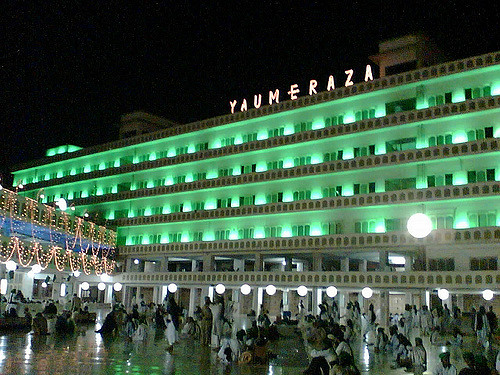|
Al Malfooz
() is a 1919 book published by Indian Islamic scholar Mustafa Raza Khan. It is a compilation of his father Ahmad Raza Khan's questions and answers during his life. Description In this book approximately 21 Sciences of Knowledge are discussed and instant answers were given with absolute precision to questions posed to the noble Imam. It gives us an idea of Imam Ahmad Raza Khan Ahmed Raza Khan, commonly known as Aala Hazrat, Ahmed Raza Khan Barelvi, or Ahmed Rida Khan in Arabic, (14 June 1856 Common Era, CE or 10 Shawwal 1272 Islamic calendar, AH – 28 October 1921 Common Era, CE or 25 Safar 1340 Islamic calendar, ... encyclopaedic, in-depth and inexhaustible knowledge. Intricate and fine problems of the sacred Shari’ah that could not be easily solved, were solved by the noble Imam within seconds without much thought. These “Gems of Wisdom” and “Beautiful Garland of Wisdom’’ in the words of the compiler – have been collected and presented to the Ummah for t ... [...More Info...] [...Related Items...] OR: [Wikipedia] [Google] [Baidu] |
Ahmad Raza Khan
Ahmed Raza Khan, commonly known as Aala Hazrat, Ahmed Raza Khan Barelvi, or Ahmed Rida Khan in Arabic, (14 June 1856 Common Era, CE or 10 Shawwal 1272 Islamic calendar, AH – 28 October 1921 Common Era, CE or 25 Safar 1340 Islamic calendar, AH), was an Islamic scholar, jurist, mufti, philosopher, theologian, ascetic, Sufi, poet, and mujaddid in British India. He wrote on law, religion, philosophy and the sciences, and because he mastered many subjects in both rational and religious sciences, Francis Robinson, one of the leading Western scholars of South Asian Islam, considers him to be a polymath. He was reformer in north India who wrote extensively in defense of Muhammad and popular Sufi practices and became the leader of a movement called "Ahl-i Sunnat wa Jamàat". He influenced millions of people, today the movement has around 200 million in the region. Biography Family Ahmed Raza Khan Barelvi's father, Naqi Ali Khan, was the son of Raza Ali Khan. Ahmed Raza Khan Barelvi ... [...More Info...] [...Related Items...] OR: [Wikipedia] [Google] [Baidu] |
Mustafa Raza Khan
Mustafa Raza Khan Qadri (1892–1981) was an Indian Muslim scholar and author, and leader of the Sunni Barelvi movement following the death of its founder, his father Ahmed Raza Khan. He was known as ''Mufti-Azam-i-Hind'' to his followers. In a biography compiled by Muhammad Afthab Cassim Razvi he is referred to as ''Mufti-e-Azam-e-Hind''. Lineage Life He wrote books on Islam in Arabic, Urdu, Persian, and announced judgments on several thousand Islamic problems in his compilation of fatawa ''Fatawa-e-Mustafwia''. Thousands of Islamic scholars were counted as his spiritual successors. He was the main leader of the Jama'at Raza-e-Mustafa in Bareilly, which opposed the Shuddhi movement to convert Muslims to Hinduism in pre-Partition India. During the time of emergency in 1977 in India, he issued a fatwa against vasectomy which was made compulsory and 6.2 million Indian men were sterilized in just a year. In such circumstances Mustafa Raza Khan argued this order of Indi ... [...More Info...] [...Related Items...] OR: [Wikipedia] [Google] [Baidu] |
Dawate Islami
Dawat-e-Islami ( ur, دعوتِ اسلامی) is a Sunni Islamic organization based in Pakistan. It has several Islamic educational institutions around the world. In addition to local charity efforts, Dawat-e-Islami offers online courses in Islamic studies and runs a television station, Madani Channel. It is associated with global Preaching of Peace which counters terrorism. Dawat-e-Islami was officially founded in Karachi in September 1981 by leading scholars who selected Ilyas as its main leader. History Arshadul Qaudri and Islamic scholar Shah Ahmad Noorani, since 1973 head of the Jamiat Ulema-e-Pakistan (JUP), along with other Pakistani Sunni scholars, selected Ilyas Qadri, who was the then Punjab president of Anjuman Talaba-e-Islam, JUP's youth wing, aged 23, as the head of Dawat-e-Islami at Dār-ul ´ulūm Amjadia. Dawat-e-Islami was established initially to dilute the influence of many wahabi group and its teachings. 2nd September 2nd September is considered as the ... [...More Info...] [...Related Items...] OR: [Wikipedia] [Google] [Baidu] |
Hasani Press,Bareilly
Hassan or Hasan is an Arabic, Irish, Scottish, or Jewish (Sephardic and Mizrahic) surname. Etymology and spelling There are several unrelated origins for this surname: * In Arabic, Hassan is a transliteration of two names that both derive from the Arabic language triconsonantal root Ḥ-S-N (): ' (), which means "good", "handsome", "excellent", or "favorable"; and ' ( حَسَّان), which means "benefactor". * In Ireland/Scotland, the surname Hassan is one of the anglicized forms of the Gaelic (Irish/Scottish) form of Ó hOsáin. It is to be distinguished from Ó hOisín and Ó hOiseáin ( Hession and Hishon). In County Londonderry, where it is numerous, it is spelt Hassan, Hassen, Hasson, Hassin and Hessin. In the Monaghan Hearth Money Rolls of 1663, it appears as O'Hassan. There was a Hasson of Wexford among the "principal gentlemen" of that county in 1598, but that family was no doubt of non-Gaelic stock, and a John Hassan was an influential merchant in Wexford fifty y ... [...More Info...] [...Related Items...] OR: [Wikipedia] [Google] [Baidu] |
